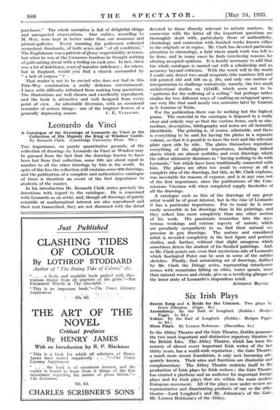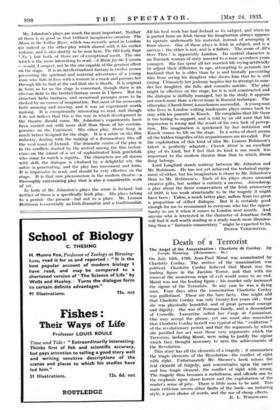Six Irish Plays
More Plays. By Lennox Robinson. (Macmillan. 5s.) IN the Abbey Theatre and the Gate Theatre, Dublin possesses the two most important and-distinctive repertory theatres in the British Isles. ' The, Abbey Theatre, which has been the nursery of almost every important Irish writer of the last thirty years, has a world-wide reputation ; the Gate Theatre, a much more recent foundation, is only now becoming ade- quately known. Their aims and functions are dissimilar and complementary. The Abbey Theatre restricts itself to the production of Irish plays by Irish writers ; the Gate Theatre has created a platform and an audience for important foreign plays and for Irish plays that are within the main modern European movement. All of the plays now under review are representative and illuminating products of one or the other theatre—Lord 'Longford's and .Mr. Johnston's- of the Gate, Mr. Lennox Robinson's of the Abbey. Mr. Johnston's plays are much the most important. Neither of them is as good as that brilliant imaginative creation The Moon in the Yellow River, which was .recently acted in London (or indeed as the other play which shared with it his earlier volume, and is also shortly to be seen here, The Old Lady Says ' No '), but both of them are of exceptional merit. The one which is the more interesting to read—A Bride for the Unicorn —would, I suspect, not be the one capable of the greatest effect on the stage. It is an intellectualized fantasy in twelve scenes presenting the spiritual and material adventures of a young man who falls in love with a woman in a mask and pursues her through life to find at the end that she is Death. It is original in form so far as the stage is concerned, though there is an obvious debt to the brothel-fantasy scene in Ulysses. But its structure lacks tautness, and occasional passages seem to be choked by an excess of imagination. But most of the scenes are both amusing and moving, and it was an experiment worth making. It is exceptionally interesting to read, and though I do not believe that this is the way in which development in the theatre should come, Mr. Johnston's experiments have been carried out with more skill than those of his contem- poraries on the Continent. His other play, Storm Song, is much better designed for the stage. It is a satire on the film industry, dealing with the making of a documentary film off the west coast of Ireland. The dramatic centre of the play is in the conflicts started by the arrival among the film techni- cians on the island of a set of sophisticated Irish gentlefolk who come to watch a regatta. The characters are all drawn with skill, the dialogue is vitalized by a delightful wit, the satire is penetrating, and the play has movement and form. It is impressive to read, and should be very effective on the stage. It is that rare phenomenon in the modern theatre—a thoroughly entertaining play that is also a considerable work of art.
In both of Mr. Johnston's plays the scene is Ireland, but neither of them is a specifically Irish play. His plays belong to a period—the present—but not to a place. Mr. Lennox Robinson is essentially an Irish dramatist and a traditionalist. All his best work has had Ireland as its subject, and when he is parted from an Irish theme his-imagination always appears to operate underneath his material, instead of arranging it from above. One of these plays is Irish in subject, and is
success ; the other is not, and is a failure. The scene of All's Over Then ? is apparently London. Its central character is an Ibsenish woman of sixty married to a man seventeen years younger. She has spent all her married life trying artificially to adjust their difference in age, attempting to persuade her husband that he is older than he is and brutally preventing him from seeing his daughter who shows him that he is still young. Ultimately her jealousy inspires her to attempt to mur- der her daughter, she fails, and commits suicide. The play might be effective on the stage, for it is well constructed and the dialogue is skilfully managed, but in the study it appears not much more than a clever essay in Ibsenist technique. The other play, Church Street, is much more successful. A young man who lives in London writing inadequate plays comes back to stay with his parents in Knock. He complains that life there is too boring to support, and is told by an old aunt that his impression is wrong and the result of his own lack of percep- tion. His imagination is quickened by her initiation and Knock comes to life on the stage. In a series of short scenes all the hidden tragedies of his acquaintances are revealed. For the exploitation of this kind of idea Mr. Lennox Robinson's talent is perfectly adapted : Church Street is an excellent play of its kind, but I feel that its kind is one much less important to the modern theatre than that to which Storm Song belongs.
Lord Longford stands midway between Mr. Johnston and Mr. Robinson. He has not yet achieved the technical equip- ment of either, but his imagination is closer to Mr. Johnston's than to Mr. Robinson's. Each of his plays shows unusual creative gifts, but neither is entirely a success. Ascendancy, a play about the fierce conservatism of the Irish aristocracy of 1829, is too weak structurally to be the tragedy it might have been ; Yahoo, a much better play, suffers from too great a proportion of stilted dialogue. But it is" certainly good enough for me to recommend to everyone who has the oppor- tunity to see it when it comes to London next month. And anyone who is interested in the character of Jonathan Swift will find it well worth reading as a study much more illumina- ting than a " fantastic commentary " might be expected to be.
DEREK VERSCHOYLE.















































 Previous page
Previous page